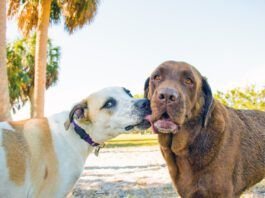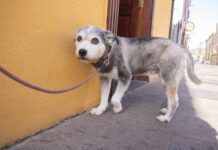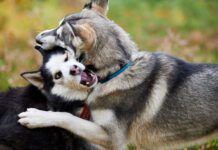Introducing a New Dog to a Jealous Dog
Jealousy is normal. Dogs get jealous because you are a resource and the source of all good things in your dog’s life. It’s naturally ingrained in a dog to not want to share, and your dog may act aggressive. This also has been seen when a new baby arrives home! Your dog doesn’t want to share the attention. But, with dogs, if your dog already truly likes other dogs and enjoys their company, it’s not a difficult proposition to introduce the concept of sharing you to that dog.
How To Train an Aggressive Dog
An aggressive dog can be dangerous and a liability in the event she hurts a person or another animal. The good news is that aggressive behavior can be successfully modified using a combination of good management and humane behavior modification.
Why Is My Dog’s Tail Down?
If your dog’s tail is down and he’s not acting like his normal self, something is likely bothering him either emotionally or physically—or both. Determining context can go a long way toward helping your pooch feel better. Is he afraid of something? If so, remove “the thing” or help him get away from the situation and see if he goes back to being his happy-go-lucky self.
Do Dogs Grieve the Loss of Another Dog?
Every one of us who has lived with and loved a dog knows the pain of grief when we lose them. But what about the other dogs in our home? Do they grieve the loss as well? Answering this question isn’t as simple as it sounds.
Why Do Dogs Bark at Nothing?
Every dog who barks has a reason for it. Every dog who barks has a reason for it. Determining the cause of barking though depends on the individual context.
Surf’s Up! How to Put an End to Counter Surfing
When a dog successfully snags food (or other items) from atop the counter or table, trainers call this “counter surfing.” If it works for them—even once—you can bet they’re going to try it again, especially when the payoff was great—like a sandwich.
Idiopathic Aggression in Dogs
Idiopathic aggression in dogs is aggression that is explosive in nature, unprovoked, and appears suddenly, often without warning.
How to Tell If Your Dog Is Playing or Fighting
Dogs that are playing often exhibit loose, bouncy movements and relaxed facial expressions. Their ears might be perked up or floppy. However, things can turn aggressive quickly, which is why dog owners need to remain vigilant.
Why Do Dogs Roll in Poop?
Most pet owners have undoubtedly witnessed the rather unsavory sight of a dog rolling in poop or dead things. But why do they do it? While there is not yet a scientific explanation for this behavior, there are theories.
Why Do Dogs Have Whiskers and Should You Cut Them?
When you think of whiskers, you probably picture cats, but dogs also possess a set of whiskers on their muzzle, cheeks, and above their eyes that serve important specific purposes.
Understanding Canine Dysfunctional Behavior
Does your dog exhibit autism-like behavior? I have had several clients ask me if their dog could have autism and whether this could explain...
Why Do Dogs Take Their Food to Different Places?
It’s dinnertime, and you’ve put your dog’s filled food bowl on the floor in its normal place. A couple of minutes later, you walk into your bedroom and hear a crunch underfoot, only to discover pieces of kibble scattered everywhere, and your pup happily devouring it, piece by piece.


















